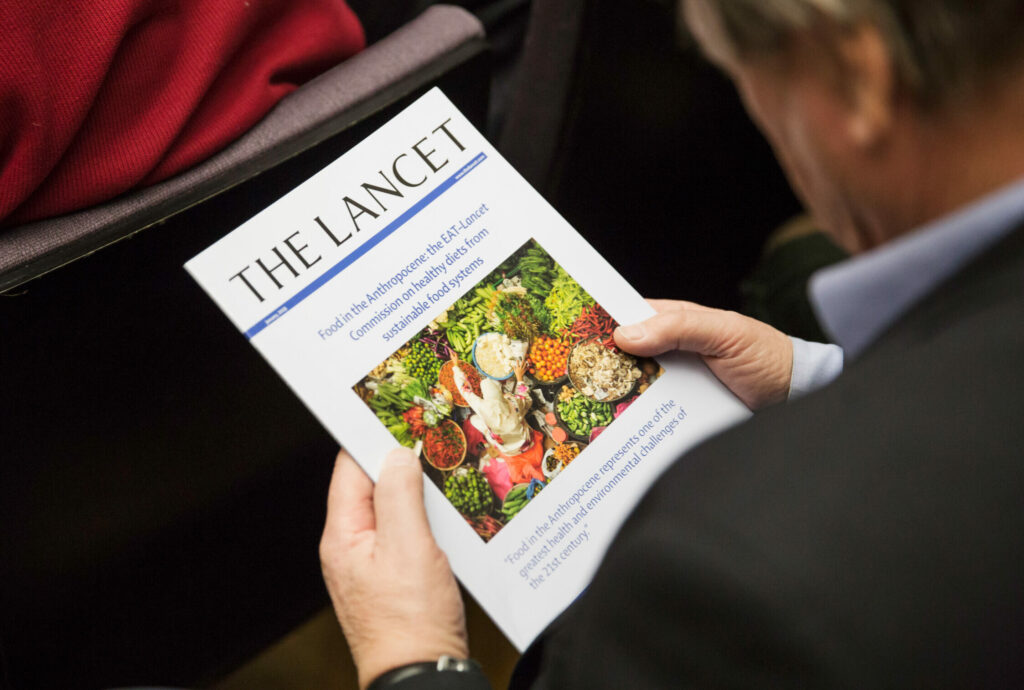
The EAT-Lancet Commission has released its new Report on Healthy, Sustainable, and Just Food Systems, outlining how to feed a growing population within planetary boundaries.
Building on the influential 2019 EAT-Lancet report, the Commission finds that shifting diets to include more fruits, vegetables, nuts, legumes, and
whole grains, along with less meat, dairy, animal fats, sugar, and excessively
processed foods, could prevent up to 15 million premature deaths per year.
Furthermore, the report concludes that food systems are the largest contributor to the transgression of five planetary boundaries, and account for roughly 30% of total greenhouse gas emissions globally. Transforming food systems could reportedly cut these emissions by more than half.
Currently, less than 1% of the world’s population is said to be in the “safe and just space”, where people’s rights and food needs are met within planetary boundaries. 32% of food systems workers are claimed to earn below a living wage, while the wealthiest 30% of people drive more than 70% of food-related environmental impacts. Additionally, more than a billion people worldwide remain undernourished.
“Transformation must go beyond producing enough calories”
According to the analysis, even with a complete global transition away from fossil fuels, food systems could still push temperatures beyond 1.5°C. Furthermore, the world has already passed six of the key Earth system processes defined by the planetary boundaries framework — climate, biodiversity, land, freshwater, nitrogen and phosphorus pollution, and novel entities (pesticides, antimicrobials, and microplastics).
The report claims that reshaping food systems could deliver returns of $5 trillion a year through better health, restored ecosystems, and climate resilience – more than ten times the $200-500 billion needed to drive food systems change. It also strengthens evidence of the benefits of the Planetary Health Diet, which sets out recommendations for healthy diets that ensure
nutritional adequacy, support optimal health outcomes, and can be adapted to different contexts and cultures.
“Our findings make it clear that transformation must go beyond producing enough calories,” said Shakuntala Haraksingh Thilsted, Commission Co-Chair and Director for Nutrition, Health and Food Security at CGIAR. “It must guarantee the right to food, fair work, and a healthy environment for all. Only when we share the benefits and burdens more equitably can we ensure that food systems are within planetary boundaries and create a safe and just space where all people can flourish.”

A fairer food system
Based on the report’s findings, the Commission outlines eight potential solutions to advance health, environmental, and justice goals:
- Protect and promote traditional healthy diets
- Create accessible and affordable food environments that increase
demand for healthy diets - Implement sustainable production practices that store carbon, create habitat, and improve water quality and availability
- Halt agricultural conversion of intact ecosystems
- Reduce food loss and waste
- Secure decent working conditions across the food system
- Ensure meaningful voice and representation for food systems workers
- Recognise and protect marginalised groups.
Each solution is supported by concrete actions identified as critical for transforming food systems, such as integrating traditional, healthy foods into dietary guidelines, supporting local seed systems, and improving agroecological practices to conserve ecosystems.
“The report sets out the clearest guidance yet for feeding a growing population without breaching the safe operating space on Earth set by the planetary boundaries,” said Johan Rockström, Commission Co-Chair and Director of the Potsdam Institute for Climate Impact Research. “It also exposes the stark winners and losers in today’s food systems, where entrenched power dynamics drive deep inequities. By uniting the latest science on health and climate, it shows that what we put on our plates can save millions of lives, cut billions of tonnes of emissions, halt the loss of biodiversity, and create a fairer food system.”




































































